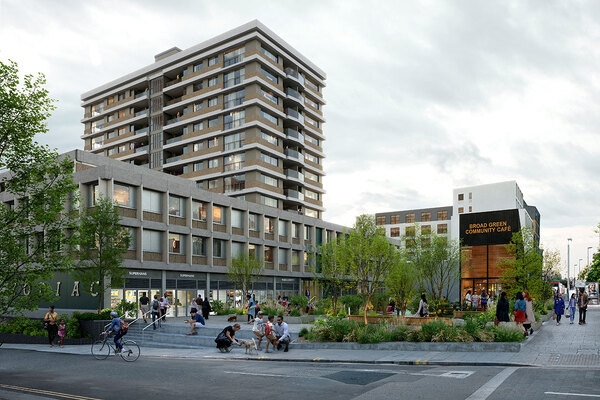You are viewing 1 of your 1 free articles
Temporary and supported housing subsidy rules led to £5.9m loss at council
Housing benefit subsidy rules for temporary and supported accommodation led to a £5.9m loss for Sheffield City Council in 2022-23.
The council suffered a £3m loss due to the subsidy rules for supported exempt accommodation, while £2.8m was lost due to the use of hotels and B&Bs for temporary accommodation.
According to a council report, the local authority is “essentially bridging the gap between rent and the amount we are able to recover via housing benefit subsidy”.
Homeless households placed in temporary accommodation who are entitled to it can claim housing benefit to go towards their housing costs.
Local authorities pay the cost of that housing benefit upfront and then are paid back by the Department for Work and Pensions (DWP) through subsidy arrangements.
Households receive the full housing benefit they are entitled to, however the amount the council can claim back is limited to 90% of the Local Housing Allowance (LHA) rates from January 2011. This means that if the cost of the housing benefit claim is higher than those rates, the local authority loses money.
The 90% rule was introduced when LHA was first reduced from the 50th percentile to 30th, in recognition of the fact that temporary accommodation is more expensive than general needs housing. At the time, this meant the LHA rate for temporary accommodation was higher.
However, the January 2011 rates are much less than the actual cost of temporary accommodation now, while the LHA rate payable for temporary accommodation is far lower than for general needs LHA.
Sheffield Council’s report, which went before its policy committee, said: “This means that if the weekly award of housing benefit for a placement in a bed and breakfast is higher than £98.08 per week, the council only receives £98.08, and the difference comes at a cost to the council.
“The average placement is in excess of £500 per week. It’s worth noting that from 2024, the government is increasing the LHA rates that have been frozen for three years.
“The one-bed LHA rate from April 2024 will be £132.33. However, the subsidy rules for temporary accommodation are not being amended to reflect this increase in the LHA rates.”
The latest government data revealed that English councils’ spending on temporary accommodation rose by 9% in 2022-23 to hit £1.7bn.
In terms of exempt accommodation, if it is provided by a housing association, the rules mean that the council receives 100% in subsidy in respect of the awards of housing benefit that are paid.
But where exempt accommodation is provided by a voluntary organisation or a registered charity that is not a housing association, the subsidy rules mean that the council does not receive 100%. This is because the amount of rent being charged is referred to the Valuation Office Agency’s rent officer, who decides on a reasonable rent for the accommodation.
Unless the claimant is classed as vulnerable, 60% of the difference between the rent officer’s decision and the award of housing benefit is subsidised.
Exempt accommodation is a type of supported housing used to house a range of people with support needs, such as people experiencing homelessness, people who have been at risk of domestic abuse, prison leavers, and those recovering from alcohol and drug addiction.
In exchange for providing support, landlords are exempt from the rules that typically limit how much housing benefit a tenant can receive.
However, it has come under increased scrutiny in recent times over concerns that some landlords have been exploiting the system, pocketing taxpayer money while not providing the support needed by tenants.
According to Sheffield Council’s report: “We have seen a proliferation of non-registered exempt accommodation providers setting themselves up in the city and taking tenants from a number of different referral routes, outside of the services commissioned by the council.
“The current legislation and the associated case law have set a very low bar that landlords need to cross to demonstrate that they are providing support to their tenants.
“This has led to a number of providers expanding in the city and they have contributed to the subsidy loss in this area. This is a national issue, and we aren’t the only council who are experiencing these losses.
“It is not clear why the DWP does not fully fund council’s for awards of housing benefit it makes on its behalf, where the landlord is not a registered provider.”
The government is set to consult on the details of the Supported Housing (Regulatory Order) Act 2023 this year. The act will apply to all supported housing and means councils will have new duties to regulate all providers.
“While this may improve some of the quality concerns, it does not address the benefit subsidy loss,” Sheffield Council said in its report.
A DWP spokesperson said: “This government is focused on improving the lives of people across the country, that’s why we are growing the economy, creating jobs and halving inflation.
“Our Local Housing Allowance increase will put around an extra £800 into the pockets of 1.6 million private renters on the lowest incomes, reducing homelessness and maintaining people’s access to the labour market.
“This subsidy policy exists to ensure the government gets value for money for taxpayers from temporary accommodation provision. We recognise the pressures local authorities face and keep the measure under review.”
Sign up for our care and support bulletin
Already have an account? Click here to manage your newsletters












